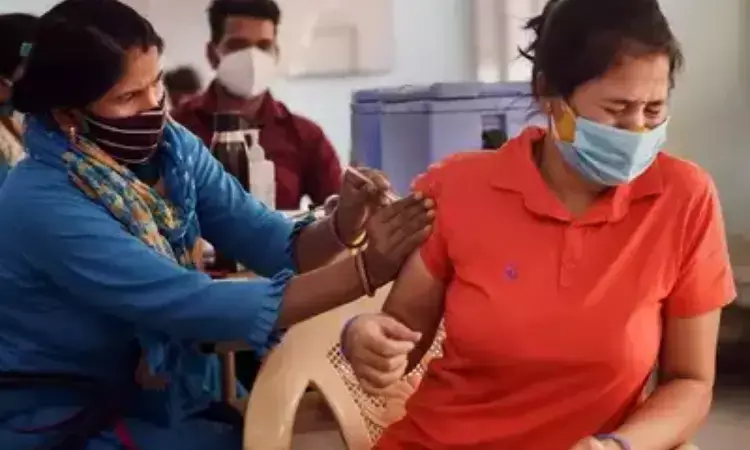- Home
- Medical news & Guidelines
- Anesthesiology
- Cardiology and CTVS
- Critical Care
- Dentistry
- Dermatology
- Diabetes and Endocrinology
- ENT
- Gastroenterology
- Medicine
- Nephrology
- Neurology
- Obstretics-Gynaecology
- Oncology
- Ophthalmology
- Orthopaedics
- Pediatrics-Neonatology
- Psychiatry
- Pulmonology
- Radiology
- Surgery
- Urology
- Laboratory Medicine
- Diet
- Nursing
- Paramedical
- Physiotherapy
- Health news
- Fact Check
- Bone Health Fact Check
- Brain Health Fact Check
- Cancer Related Fact Check
- Child Care Fact Check
- Dental and oral health fact check
- Diabetes and metabolic health fact check
- Diet and Nutrition Fact Check
- Eye and ENT Care Fact Check
- Fitness fact check
- Gut health fact check
- Heart health fact check
- Kidney health fact check
- Medical education fact check
- Men's health fact check
- Respiratory fact check
- Skin and hair care fact check
- Vaccine and Immunization fact check
- Women's health fact check
- AYUSH
- State News
- Andaman and Nicobar Islands
- Andhra Pradesh
- Arunachal Pradesh
- Assam
- Bihar
- Chandigarh
- Chattisgarh
- Dadra and Nagar Haveli
- Daman and Diu
- Delhi
- Goa
- Gujarat
- Haryana
- Himachal Pradesh
- Jammu & Kashmir
- Jharkhand
- Karnataka
- Kerala
- Ladakh
- Lakshadweep
- Madhya Pradesh
- Maharashtra
- Manipur
- Meghalaya
- Mizoram
- Nagaland
- Odisha
- Puducherry
- Punjab
- Rajasthan
- Sikkim
- Tamil Nadu
- Telangana
- Tripura
- Uttar Pradesh
- Uttrakhand
- West Bengal
- Medical Education
- Industry
Various COVID-19 Vaccines linked to Guillian- Barre Syndrome

There has been an increasing number of COVID-19 vaccine-related Guillain-Barre syndrome (GBS) following both messenger-RNA vaccine and adenovirus-vectored types causing public concern and the necessity to inform physicians about the variations of its presentations given its life-threatening consequences.
Guillain-Barré syndrome (GBS) is an immune-mediated polyradiculoneuropathy that is usually preceded commonly by infections such as Campylobacter jejuni, Mycoplasma pneumonia, the alphavirus chikungunya, the flaviviruses and viral outbreaks (Zika virus). Moreover, it has been linked to vaccination such as the influenza vaccine. With the emergence of severe acute respiratory syndrome coronavirus 2 (SARS-CoV-2) infection, the association of GBS has been increasingly reported worldwide.
More recently, COVID-19 vaccine-related GBS has been described for both messenger-RNA vaccine and adenovirus-vectored types in a few cases. Although it is relatively uncommon, identifying the clinical presentations and the outcome of GBS following different COVID-19 vaccinations among different populations is essential, given the life-threatening consequences.
Researchers from Egypt report a case series of six males and one female with ages ranging from 29 to 59 years who presented with variable GBS manifestations from December 2021 to February 2022. Three patients received the AstraZeneca vaccine, two received the Pfizer vaccine, one received the Sinopharm and one received Janssen vaccine. Latency ranged from 5 to 60 days and cases achieved either partial or complete improvement after plasmapheresis. Although the outcome was favorable, partial recovery only was achieved.
In these aforementioned cases, GBS occurred following the vaccination. The authors suggest that vaccinations lead to producing T cells and antibodies and this could cross-react with the nerve roots structures. They say that a sharp watch should be kept for the variable presentations of GBS following different COVID-19 vaccination.
Attention drawn to such can lead to early identification and appropriate management, which in turn can lead to better outcomes.Reference: Shalash, A., Belal, N., Zaki, A.S. et al. Guillain–Barré syndrome following different COVID-19 vaccines: a case series. Egypt J Neurol Psychiatry Neurosurg 58, 153 (2022).
DOI: https://doi.org/10.1186/s41983-022-00582-7
MBBS, DrNB Neurosurgery
Krishna Shah, MBBS, DrNB Neurosurgery. She did her MBBS from GMC, Jamnagar, and there after did direct 6 Year DrNB Neurosurgery from Sir Ganga Ram Hospital, Delhi. Her interests lie in Brain and Spine surgery, Neurological disorders, minimally invasive surgeries, Endoscopic brain and spine procedures, as well as research.
Dr Kamal Kant Kohli-MBBS, DTCD- a chest specialist with more than 30 years of practice and a flair for writing clinical articles, Dr Kamal Kant Kohli joined Medical Dialogues as a Chief Editor of Medical News. Besides writing articles, as an editor, he proofreads and verifies all the medical content published on Medical Dialogues including those coming from journals, studies,medical conferences,guidelines etc. Email: drkohli@medicaldialogues.in. Contact no. 011-43720751


